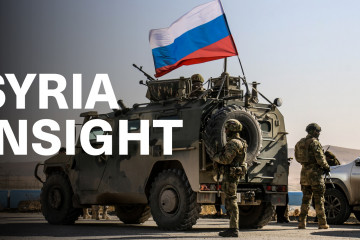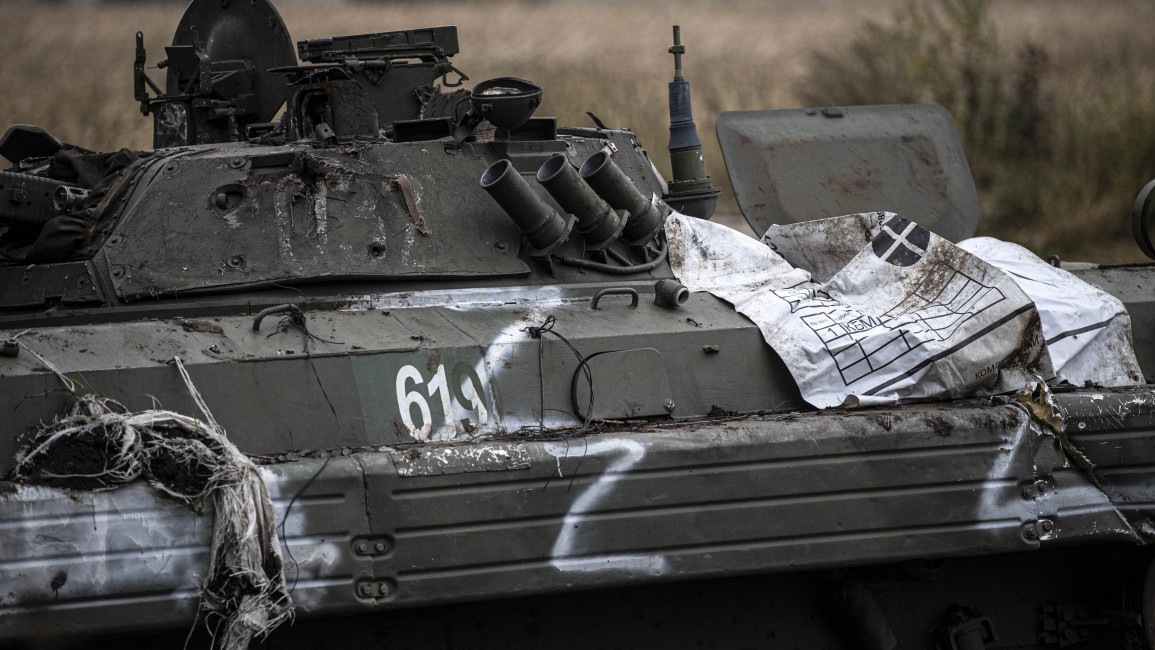

As Vladimir Putin announced the first general mobilisation in Russia since the Second World War, Moscow's air force pounded villages in northern Syria.
The timing of the bombing - coinciding with a return to schools - appeared manufactured to announce that despite Russia's devastating losses in Ukraine, its forces in Syria are going nowhere.
Attacks on Idlib had somewhat declined as Russia focused its attention on Ukraine, but after huge losses in a surprise Ukrainian northern offensive, bombs rained down on the opposition stronghold on a daily basis again this week, including close to refugee camps.
Analysts say that in the coming months Syrians can expect violence to intensify as Russia demonstrates to its friends in the region it will stay the course in Syria.
"For now, Russia will likely consolidate its gains in Syria, which includes an airbase and expanded naval facility in Latakia and Tartous, while the rebels are contained in northern Syria"
Intervention
Moscow's use of air power since its 2015 intervention to hit lightly armed rebel forces after Syrian regime forces lost Idlib province to the opposition has allowed it to save Bashar Al-Assad's regime from collapse and at relatively little human cost for Russia.
Yet its presence in Syria is opaque, in part due to Moscow not publishing reliable figures of the number of Russian servicemen and women there and its reliance on the shadowy Wagner Group mercenary force.
While there has been renewed talk of Russian forces being transferred from Syria to Russia there is no evidence that Moscow is winding down its operations in the country.
Fighter planes and maintenance crew are of less use in Ukraine where, unlike in Syria, Russian pilots face a military armed with cutting-edge air defences.
"We don't know how many soldiers they have withdrawn from Syria because from the start we had no idea how many were stationed there," said Ruslan Trad, security researcher at Atlantic Council’s DFRLab and co-author of 'Russian Invisible Armies'.
"There is no indication that Russia has withdrawn troops from Syria, but they have moved equipment because they need this on the ground in Ukraine," he told The New Arab.
"Syria and Libya remain the primary bases outside the Russian Federation for establishing a presence in other parts of the world," Trad adds, highlighting the importance of its Libyan bases to its presence in West and Central Africa.
For now, Russia will likely consolidate its gains in Syria, which includes an airbase and expanded naval facility in Latakia and Tartous, while the rebels are contained in northern Syria.
What Russia appears ready to transfer from Syria to Ukraine are S-300 air defence systems, which will be of some relief to Israel, which has stepped up its air strikes on Iranian forces as far north as Aleppo.
Russia might also send more experienced officers, NGOs, and paramilitary fighters from Syria and Libya to train the tens of thousands of new recruits donning Russian uniforms after the general mobilisation announcement.
"It is very clear that Russia has very serious issues in its officer echelon. They have problems coordinating between different units and each is blaming the other for the problems in Ukraine," said Trad.
|
|
Russian losses
Russia's poor performance in the Ukraine invasion mirrors cases in Syria and Libya where its soldiers and proxies faced well-armed and trained enemy combatants and suffered losses.
Hundreds of Russian Wagner fighters - officially private military contractors but essentially a branch of Russia’s special forces, Trad says - were possibly wiped out in a battle between pro-regime militias and the US-backed Syrian Democratic Forces at the Conoco gas field.
"We have different accounts of a few dozen to 200 dead, but if you look at Russian media reports even small villages in the far east were receiving coffins so the image is very grim for Russia," Trad said.
"You can imagine there are also many deaths among Wagner forces active in the Syrian desert region, where there are frequent attacks by Islamic State group forces."
In Libya, the Wagner Group and Russia were also unsuccessful in helping warlord Khalifa Haftar seize the capital Tripoli.
Ukraine factor
Despite these losses, Wagner fighters are among the best-trained and most battle-hardened in the Russian military and there are signs their deployment to Ukraine has been partially successful, Samuel Ramani, a tutor of politics and international relations at the University of Oxford, believes.
"We saw Wagner play a significant role in the Donbas offensive, which led to the capture of Luhansk oblast, and now we are seeing it Donestsk. There are many in the Russian military who are saying that Wagner Group is the most effective set of units in Ukraine," he told The New Arab.
One general brought to Ukraine was Alexander Dvornikov, who gained a strong reputation in Syria for integrating Russian and Syrian militaries and instilled a sense of discipline among Moscow-aligned troops.
He has been unable to replicate this with the Russian military and its proxies in Ukraine, contributing to its humiliating losses on the battlefield.
"The most significant disappointment for Russia was the inability of a lot of their major generals, who have fought in Syria, to be able to convert their military techniques to the Ukrainian theatre," said Rahmani.
"Analysts say that in the coming months Syrians can expect violence to intensify as Russia demonstrates to its friends in the region it will stay the course in Syria"
"The battlefield experience in Syria has helped but not nearly enough and certainly the generals have not been performing at a level one would expect."
With both countries isolated from much of the world, Iranian-Russian cooperation has been strengthened, as was witnessed with Tehran’s elevation in the Shanghai Cooperation Agreement.
Iran has supplied desperately needed drones to Russia and economic engagement has intensified but on a local level in Syria the same competition and distrust remain.
An increase in Israeli airstrikes on Iranian targets in Syria - including Aleppo and Damascus airports – shows that Moscow is unwilling to sacrifice its relations with Israel for the sake of the increasingly strong ties with Tehran.
"Iran obviously had trepidations about the potential movement of S-300 weapons systems out of Syria because that makes their forces much more vulnerable to Israeli strikes," Rahmani said.
"Iran has become, alongside maybe North Korea and Belarus, one of the only countries in the world to supply military hardware for Russia's invasion of Ukraine. So, the positives in this relationship greatly outweigh any frictions over Syria."
|
|
Russian prestige
Russian setbacks in the war in Ukraine could impact its prestige among the Syrian public, particularly if Israeli airstrikes continue with the obvious acquiescence of Moscow.
The Syrian regime though remains in Putin's debt and has been perhaps the most vocal supporter of Russia's invasion on the international stage.
At the UN, Syria has continuously backed Moscow at votes and was one of only three countries (including Russia) to recognise the breakaway republics of Donetsk and Luhansk in eastern Ukraine.
Syrian regime media has readily adopted Russian rhetoric about "de-nazifying" Ukraine, while Assad shills have orchestrated pro-Russian rallies in Aleppo and Damascus.
Yet Russia's image as an apparently insurmountable military power has been dented by its inability to defeat Ukraine and could strengthen opposition soft power amid increased collaboration between Syrian and Ukrainian activists.
"For the Syrian people, Russia's soft power has been eroded further. There is clear evidence now that Russia is carrying out very similar kinds of tactics in Ukraine (as in Syria) - war crimes, bombing of schools, bombing of hospitals, basically turning Mariupol into a second Aleppo," Ramani said.
"Russia tries to work with the Assad regime and choreograph pro-Russia demonstrations, forming Z symbol human chains (a letter synonymous with the Russian army) at Syrian universities but equally there's activism from the Syrian opposition in support of the Ukrainians."
"The Syrian regime remains completely reliant on foreign powers - namely Russia and Iran, both under significant economic strain - for its survival"
Regional concerns
In the wider region, the Ukraine war remains a peripheral issue, Bente Scheller, Head of the Middle East Division at the Heinrich Boell Foundation, said, but its outcome will likely impact on Putin's 'strongman' image.
"Many in the region don't consider the Ukraine war their war and that there's nothing wrong with the intervention or that it's not their cause. Many see it as a European issue, so it's not affected Putin's reputation in the region so much," Scheller told The New Arab.
"If Russia is defeated in Ukraine, then it will have repercussions we can't yet see. A lot will depend on Putin's status, will he still be in office? If so, he will likely focus more on Syria to see what he can achieve."
Putin has invested heavily in building Russia's image in the region via oil production agreements with Gulf states, arms sales to countries such as Egypt, close cooperation with Turkey and Iran on Syria, and armed interventions.
Despite its best efforts, Russia has been largely unsuccessful in linking its main ally, Syria, with the wider region despite normalisation with the UAE, Oman, Jordan, and others.
Deeper and real political normalisation and potential investment opportunities with Arab states have been hampered by US sanctions.
The Syrian regime remains completely reliant on foreign powers - namely Russia and Iran, both under significant economic strain - for its survival, lacking popular support, unable to retake opposition and Kurdish territories, and largely isolated from the world.
As the war rolls on Ukraine, Russia will find its cards in Syria increasingly limited.
One opportunity for Russia to flex its muscles on the international stage is in January when the UN next votes on cross-border aid to Syria.
Russia could use its veto to block humanitarian access to opposition Idlib, potentially starving 4 million people of food and medicine. Alternatively, Putin could also see what bargains it can extract from the international community in exchange for not wielding its veto, said Scheller.
"Ukraine is the absolute priority and although it won't let go of Syria, it knows it can't change anything neither inside Syria nor on an international level," said Scheller.
"With the January vote, we will see what Russia tries to push for and if it sees any advantage in extending the mandate but definitely this will be an opportunity for Russia to show it still has international power no matter how it performs in Ukraine."
Paul McLoughlin is a senior news editor at The New Arab.
Follow him on Twitter: @PaullMcLoughlin





 Follow the Middle East's top stories in English at The New Arab on Google News
Follow the Middle East's top stories in English at The New Arab on Google News


